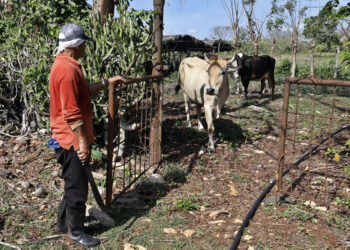Cuban students obtain results above the regional average, according to a study of the educational systems of Latin America presented this Tuesday by UNESCO, which urges Havana to maintain its efforts in this area.
According to the 2019 Regional Comparative and Explanatory Study (ERCE), Cuba is above the regional average in Reading and Mathematics in third grade; and in Reading and Science in sixth grade, while in Mathematics its achievements are similar to the regional average. In addition, there is no gender gap in Mathematics and Science, although there is in Reading.
In Reading, Cuba obtained 730 points in third grade compared to 697 of the regional average. It also had a lower percentage of students in level I, with the lowest performance, (30.3%) than the average (44.3%) and a higher percentage in level IV, the one with the best performance, (21.1%) with respect to the region. (15.7%).
In sixth grade, Cuba scored 738 points, compared to 696 of the Latin American average. The lower proportion of students in level I (11.9%) compared to the region (23.3%) and a higher proportion in level IV (26%) compared to 16.4% stand out.
In third-grade Mathematics, Cuba obtained 751 points compared to the average of 698. In addition, the study found that three out of every four Cuban students are above the lowest level of performance.
In sixth grade, Cuba achieved 689 points, a figure similar to the regional average (696 points). However, it has a higher proportion of students in level I (53%) than the region (49.2%); but in sixth-grade Science Cuba obtained 779 points, a score higher than the regional one (702 points).
In addition, the proportion of students in level I of performance decreases significantly (17%) compared to the region (37.7%), and also increases the percentage of those who are located in level IV, with the highest performance (24.4%), which corresponds to four times the average reached by the region (5.9%).
The coordinator of the Laboratory of the Latin American Laboratory for Evaluation of the Quality of Education (LLECE), of the Regional Office of Education for Latin America and the Caribbean (OREALC/UNESCO Santiago), Carlos Henríquez, pointed out that Cuba’s challenges are to achieve “a more inclusive and equitable education.”
Más de 600.000 estudiantes regresan a las aulas cubanas tras la pausa por la COVID-19
Henríquez considered that the country must “recognize the importance of gender equality and cultural diversity” and “promote educational opportunities so that each and every student has the fundamental learning for their development.”
Cuban Minister of Education Ena Elsa Velázquez Cobiella affirmed for her part that the results of this study, together with other national analyzes, will serve to “raise the quality of Education in the country.”
In Cuba, 10,399 students participated in the study, of the total of 160,000 minors who took the test in 16 countries (Argentina, Brazil, Colombia, Cuba, Costa Rica, Ecuador, El Salvador, Guatemala, Honduras, Mexico, Nicaragua, Panama, Paraguay, Peru, Dominican Republic and Uruguay).










